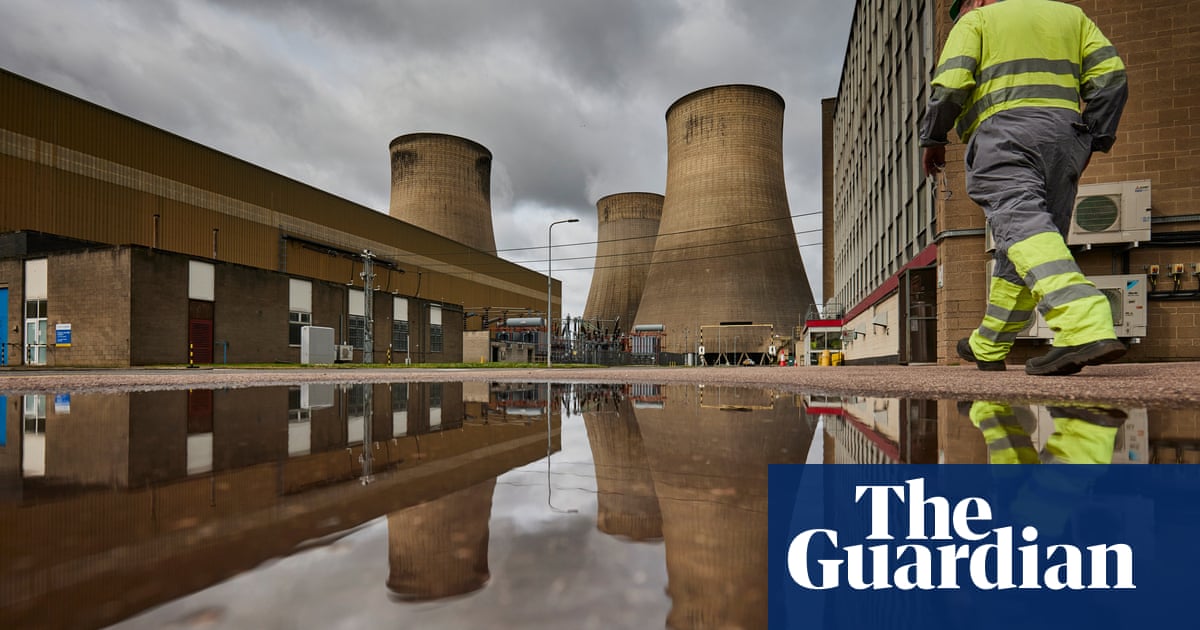Britain’s only remaining coal power plant at Ratcliffe-on-Soar in Nottinghamshire will generate electricity for the last time on Monday after powering the UK for 57 years.
The power plant will come to the end of its life in line with the government’s world-leading policy to phase out coal power which was first signalled almost a decade ago.
The closure marks the end of Britain’s 142-year history of coal power use which began when the world’s first coal-fired power station, the Holborn Viaduct power station, began generating electricity in 1882.
The shutdown has been hailed by green campaigners as a major achievement for the government in reducing the UK’s carbon emissions, providing international climate leadership, and ensuring a “just transition” for staff in Britain’s coal industry.
Michael Shanks, the minister for energy, said: “Today’s closure at Ratcliffe marks the end of an era and coal workers can be rightly proud of their work powering our country for over 140 years. We owe generations a debt of gratitude as a country.”
The UK became the first country to set an end date for coal power from 2025 after putting in place increasingly stringent green regulations to reduce the running hours of its coal plants.
Ministers strengthened the UK’s leadership on phasing out coal by calling for the deadline to come forward by a year, shortly before the UK hosted the UN’s Cop26 climate talks in Glasgow in late 2021.
Ratcliffe’s 170 remaining staff will be invited to gather in the canteen on Monday where a live stream from the power plant’s control room will show the moment that its generating units are turned off for the last time.
Peter O’Grady, Ratcliffe’s plant manager, said: “This whole year has been a series of poignant moments. I’m sure there will be a few tears as the whole thing stops and as people leave.”
The coal plant once employed 3,000 engineers but its workforce has declined in line with its power output over recent years. Coal power made up 80% of the UK’s electricity in the early 1980s, and 40% in 2012, before petering out in the last decade due to costly carbon taxes and the rise of cheaper renewables.
“This is the final chapter of a remarkably swift transition from the country that started the industrial revolution,” said Phil MacDonald, managing director of global energy thinktank Ember.
A report by Ember found that coal power has halved among Organisation for Economic Co-operation and Development (OECD) countries since reaching a peak in 2007. Coal power made up 17% of electricity generated by OECD countries last year, according to Ember, but 27 of the 38 member states have pledged to be coal-free by the end of the decade.
Ed Matthew, a director at climate crisis thinktank E3G, said: “The UK was the first country to build a coal-fired power station. It is right that it is the first major economy to exit coal power. This is true global leadership, lighting the path for other countries to follow.”
Tony Bosworth, a campaigner with Friends of the Earth, said: “The priority now is to move away from gas as well, by developing as fast as possible the UK’s huge homegrown renewable energy potential and delivering the economic boost that will bring. But this vital green transition must be fair, by protecting workers and benefiting communities.”
Staff were first told in 2021 that the plant would close in late 2022 but Ratcliffe’s owner, the German energy company Uniper, later said it would keep the plant running during the Europe-wide gas crisis triggered by Russia’s invasion of Ukraine under an agreement with the government.
Uniper has worked with unions to help many engineers into new jobs at the company’s other power plants or into training which could lead to work in other areas of the energy industry. More than 100 are expected to remain at the plant to carry out decommissioning work over the next two years.
Michael Lewis, Uniper’s chief executive, said: “For me, Ratcliffe has always been more than just a power station – it has been a pillar of the UK’s energy security for decades. Built during a time when coal was the backbone of industrial progress, Ratcliffe powered over 2m homes and businesses – equivalent to the entire East Midlands region. It played a crucial role in boosting economic growth and supporting the livelihoods of thousands of people.
“This will be the first time since 1882 that coal has not powered Great Britain. As we close this chapter, we honour Ratcliffe’s legacy and the people working here, while embracing the future of cleaner and flexible energy,” he said.

